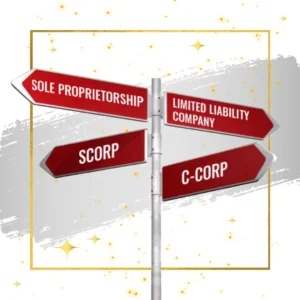Group Mental Health Practice Business Structures
You are a business owner. Maybe you have a small business with dreams of becoming a thriving business entity. You are educated and skilled as a healthcare professional, ready to help your clients. However, you may be less knowledgeable about your business structure options and all that entails. When you think about state laws, employer identification numbers, income tax implications, legal structures, malpractice protections, and choosing a business name, it can all be overwhelming, even frightening.
To help support your mental health and calm your nerves, this blog gives you the basics you need to know to choose your business structure. Of course, there is a disclaimer. One blog post is no substitute for legal advice and accounting assistance, so know that this is for educational purposes to assist you as you seek the proper help and have those crucial conversations.
To assist you in this endeavor, this blog will explore the following:
- The types of business structures
- The pros and cons of a sole proprietorship
- The pros and cons of a limited liability company (LLC)
- The pros and cons of an S corporation (SCORP)
- The pros and cons of a C corporation (C-Corp)
- Hiring the right accountant
- Helpful Next Steps for your private practice journey
The Types of Business Structures for Your Group Counseling Business
As an entrepreneur, you need to know the most common four business structures to determine which is right for you.

- Sole Proprietorship: A sole proprietorship is a business structure where an individual owns and operates a business as a single person.
- Limited Liability Company (LLC): A Limited Liability Company (LLC) is a popular business structure that provides liability protection with some tax benefits.
- S corporation (SCORP): An S corporation (SCORP) is a type of business structure that provides the benefits of a corporation.
- C corporation (C-corp): A C corporation (C-Corp) is a type of business structure that is a separate legal entity from its owners.
The Pros & Cons of a Sole Proprietorship in Your Group Psychotherapy Business
A sole proprietorship is common for startup businesses. It is a good choice when looking for a simple and easy-to-manage business structure.
Here are some pros and cons of sole proprietorship:
Pros:
- Easy to start: Starting a sole proprietorship is relatively easy and inexpensive compared to some other structures.
- Complete control: The sole proprietor has full control over the business and can make all decisions.
- Simple tax structure: A sole proprietorship has a simple tax structure. All profits and losses from the business are reported on the owner’s personal income tax return, and the owner pays taxes on the profits.
- Low operational costs: Since the business is owned and operated by a single person, there are no additional costs associated with hiring employees.
Cons:
- Unlimited personal liability: A sole proprietorship does not protect your personal assets. Your personal assets can be used to pay off any business debts.
- Limited resources: A sole proprietorship may have limited resources to operate and grow the business.
- Limited lifespan: A sole proprietorship depends on the owner. If the owner dies or becomes incapacitated, the business may be dissolved.
- Difficulty in raising capital: Since a sole proprietorship is a one-person operation, raising capital through lenders and investors can be challenging.
The Pros and Cons of Counseling Limited Liability Companies (LLCs)
A Limited Liability Company (LLC) can provide significant benefits, particularly in liability protection. However, it is more complex.
Be aware that certain healthcare professionals may need to establish a Professional Limited Liability Company (PLLC). A PLLC is a specialized type of LLC designed for professionals that provides limited liability protection while allowing them to operate their businesses as licensed professionals.
If you have a partner in your private practice, you may consider setting up a Limited Liability Partnership. ( LLP), combining a partnership’s features with the LLC’s limited liability protection.
Here are some of the pros and cons of an LLC business structure:
Pros:
- Limited liability: LLC owners are not personally responsible for the company’s debts and liabilities. To have this liability protection, you must separate business and personal checking accounts, credit cards, etc.
- Flexible tax structure: An LLC is taxed as an individual with self-employment taxes, which means that profits and losses appear on the owner’s personal tax returns, avoiding double taxation. Your structure affects your tax rate, which can affect your personal income, retirement, and other financial aspects of your business.
- Easy to set up and maintain: Setting up and maintaining an LLC is relatively easy compared to a corporation to an SCORP or C-Corp.
Cons:
- Cost of set up: Setting up an LLC can be more expensive than a sole proprietorship due to the need for formal documents and state registration.
- Self-employment taxes: LLC members are subject to self-employment taxes, which can be higher than the taxes paid by employees of a corporation.
- Limited lifespan: Like a sole proprietorship, an LLC is dependent on the owners, and if the owners die or leave the company, the LLC may be dissolved.
- Complexity in decision-making: Once you move past a sole proprietorship, other people may be involved in the company, creating a more complex management structure.
The Pros and Cons of an S corporation (SCORP) in Your Private Group Practice
When your business grows to a revenue of $50,000 per year, you have the option of starting an S corporation (SCORP). Still, a higher rate of revenue is usually desired. This is done for tax purposes, since an SCORP can help avoid huge tax bills.
With an SCORP, you put yourself on the payroll, avoiding self-employment taxes. An SCORP can also set company matching policies for social security taxes and retirement planning.
Here are some of the pros and cons of an S corporation:
Pros:
- Limited liability: Like a traditional corporation, S corporations offer personal liability protection.
- Tax benefits: S corporations can pass through profits and losses to shareholders’ personal tax returns, avoiding double taxation. An SCORP is not subject to federal income tax.
- Easy to raise capital: S corporations can raise capital by selling stock to investors, which can help the business grow and expand.
Cons:
- Formalities: S corporations must follow strict formalities, such as keeping detailed records of business decisions.
- Cost of set up: Setting up an S corporation can be more expensive than other business structures due to the need for formal documents and state registration.
- Limited flexibility in allocations: S corporations are subject to strict rules governing the allocation of profits and losses.
The Pros & Cons of a C-Corp in Your Private Therapy Practice
A C-Corporation can be a beneficial business structure for businesses requiring liability protection and planning long-term growth and expansion.
Here are some of the pros and cons of a C-Corp business structure:
Pros:
- Limited liability: C-Corps offer personal liability protection.
- Separate legal entity: C-Corps are a separate legal entity from their owners, allowing the corporation to own property, enter into contracts, and sue or be sued in its own name.
- Continued existence: C-Corps can continue to exist even after the death of their owners, ensuring that the business can continue to operate and grow.
Cons:
- Double taxation: C-Corps are subject to double taxation, meaning that profits are taxed at the corporate level and then again when distributed as dividends to shareholders.
- Formalities: C-Corps must follow strict formalities, such as holding annual shareholder meetings and keeping detailed records of business decisions.
- Cost of set up: Setting up a C-Corp can be more expensive than other business structures due to the need for formal documents and state registration.
- Complex management structure: C-Corps are a larger business entity creating a more complex management structure.
Hire the Right Accountant for Your Psychotherapy Business
Evaluating these business structures can be complex, so you must hire the right accountant. You need someone that knows you as a client in addition to your business. Here are a few things to remember:

- Find a person you trust. Find someone who will give you the truth, not just what you want to hear.
- Keep high standards. Find professional service that provides personalized attention, availability, knowledge, accuracy, referrals, and transparency in record keeping.
Seek education: Find someone willing to take the time and make the effort to educate you.








